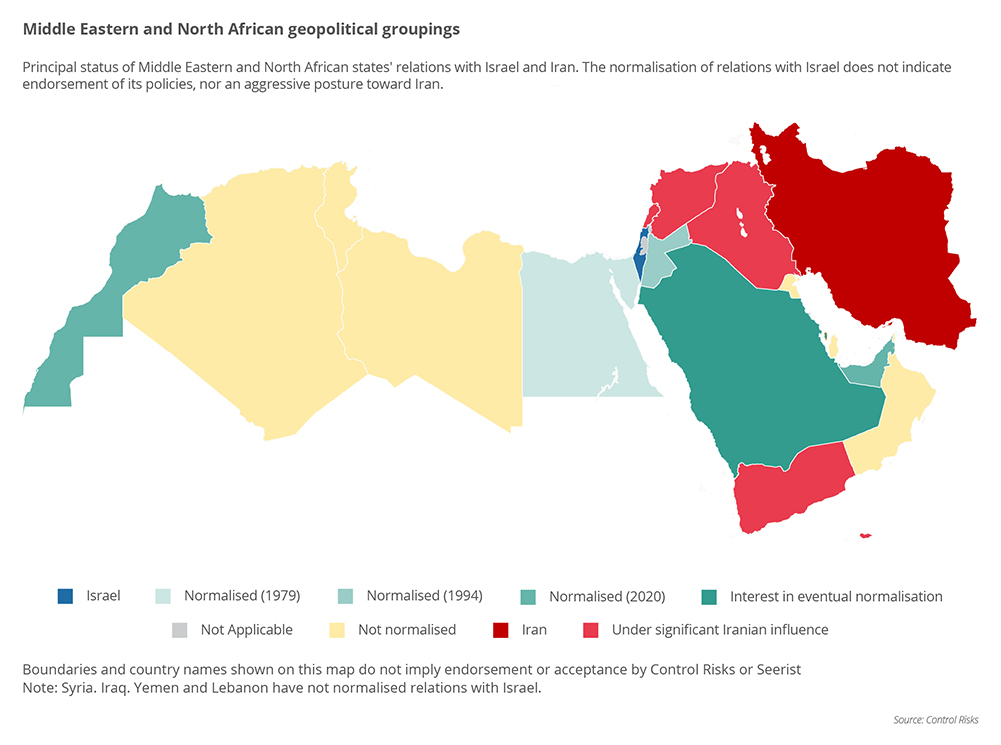This is an example of the analytical insight available on Seerist, a Control Risks company.
Iran’s direct cross-border missile and drone attack on Israel on 13-14 April brought the shadow war between the two countries into the open. Israel on 19 April appeared to retaliate as Iran reported intercepting drones over Isfahan and Tabriz. Control Risks considers Middle East-wide implications.
Israel’s response
Conflicting accounts have emerged regarding the exact nature of Israel’s presumed response on 19 April. Israeli newspaper the Jerusalem Post has reported that strikes on Iranian soil had involved missiles fired by “long distance aircraft”. However, Iranian state-sponsored news agencies have described the development as mostly inconsequential and has so far refrained from attributing responsibility. Iran’s relatively muted reaction suggests it is intent on avoiding a further escalation. Still, the Israel-Iran shadow war will continue over the coming weeks and sporadic escalatory episodes will remain likely, with implications for regional states.

Regional states that host Iranian forces or Iran-backed groups will continue to face significant threats over the coming weeks, as Israel maintains intent to roll back the Islamic republic’s regional influence. In doing so, Israel will likely continue targeting infrastructure used by Iran-linked interests, particularly in Syria and Lebanon. Israel could also conduct sporadic and targeted strikes against infrastructure used by both civilians and Iranian interests, including assets in the vicinity of ports and airports. Importantly, we assess that, should Israel strike dual-use infrastructure, it would likely seek to limit the extent of threats to civilians – particularly in Lebanon. Furthermore, Israel could seek to expand the scope of its retaliation to include Iran-linked maritime assets – though somewhat less plausibly – assets in Iraq and Yemen.
Western allies in the region have sought to avoid being perceived as picking a side through these rounds of retaliatory action. Jordan was careful to portray its participation in interception operations on 13-14 April as a matter of national defence. And although Gulf Arab states reportedly shared information provided by Iran about the attack to help prepare interception missions, they denied access to their airspace to US and Israeli jets carrying out these missions. No Arab Western ally has so far been reported to have supported Israel’s presumed retaliation against targets on Iranian soil on 19 April. This balanced approach, along with continued backchannel engagement with Iran on the part of Gulf Arab states, will help contain physical security threats over the coming weeks.
Business implications
Foreign companies with operations in the region should continue to monitor the situation closely and have crisis management teams on standby, as well as consider business continuity implications from operational risk, such as disruption of aviation operations over the coming weeks. Operators have already modified flight schedules, and sporadic airspace closures will remain plausible over the coming weeks, particularly over Israel, Iran, Iraq, Jordan, Syria and Saudi Arabia. Organisations with exposure to clients, suppliers and partners in the region will also need to stay alert to expansions of sanctions regimes against Iran and its affiliated groups and be ready to step-up compliance protocols.
